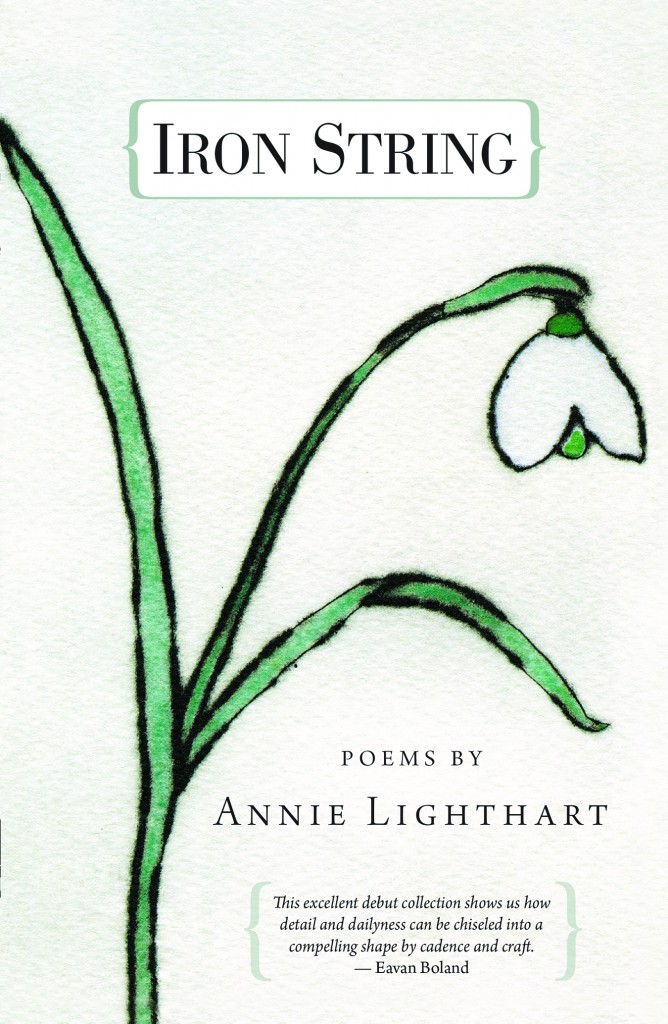Annie Lighthart. Iron String. Airlie Press, 2013. 77 pages. $15.00
Reviewed by Kasey Jueds, Guest Reviewer
“I stop again and again/to hear the second music,” Annie Lighthart writes in the first poem of her collection Iron String, a poem which functions as a luminous ars poetica, a map for all the poems that come after. The two musics here—“one easier to hear, the other/lower, steady, perhaps more faithful for being less heard/yet always present”—are the musics Lighthart listens to and makes known to us throughout her wise and graceful book, which concerns itself with the everyday noise of rain, birds, children playing or crying, and with the numinous music that runs beneath these sounds like an underground river.
Some poems, like some people, don’t reveal themselves easily. They are slippery or barbed, difficult to engage with, to find a way into and through. These sorts of poems present their own pleasures and rewards, but they can also frustrate, can seem to withhold on purpose.
The poems in Iron String offer a deep and different type of pleasure, one that seems rare to me these days: the pleasure of open-heartedness, of deep feeling and thinking offered as gift. They manage to speak both clearly and surprisingly of often-mysterious things, of emotional and spiritual states that feel absolutely true at the same time as they feel unnamable—except, of course, in the way Annie Lighthart does name them, by making them into poems that become their names.
One of the collection’s many beauties is the full expanse of its feeling life. In the poem titled “February,” the speaker is “too small for much wreckage, too tight and done with resisting.” In “Light Rain,” after a painful argument, she is “ready to fail,/to go back inside and begin it again.” And in “The Sea Lion Tank,” she recognizes that “to rise in the morning/could be to lift your head from that sleep/and love each salted star for what it may bring.” Iron String’s moments of epiphany, of tenderness and love, feel believable because they feel earned: the poems speak with quiet authority of both tenderness and its difficulty, its lack.
The poems feel bravely themselves: bravely non-ironic, bravely forthright in naming abstractions (love, grief) and making them alive in their ways of seeing the things of the world: a loaf of bread, a cow in a field. The poems’ quotidian details are gates into their world of recognition and newness. I love the balance of relief and wonder these poems offer: relief because they reveal their truths so generously, and wonder because they do so strangely, magically, startlingly. In “There Were Horses,” Lighthart writes, “An open white page in any book was a lean white horse/looking out, and a swollen door stuttering at night was the breath and stamp of a horse nearby.” Here are the familiar forms of horse, book, and door, both reassuringly, invitingly themselves, and magically transformed. (Or possibly not transformed, but seen through into the otherness they also are.) Later in the same poem: “Those days we brushed each others’ hair like the manes of horses/and with their kindness gave each other kingly gifts.” The generous, open-hearted psychic space of this poem—and many others in the book—feels so deeply lived, reading it makes it easy to believe such a way of being is possible.
This has been a difficult review to write. Not because Iron String did not move me deeply, but because it did. And because it is beautiful. In her introduction to Katherine Larson’s Radial Symmetry, Louise Glück writes that our natural response to beauty is silence. It’s been challenging to move beyond silence (my own first reaction to Iron String: a wordless sense of happiness and gratitude) to find the right words to describe Lighthart’s book.
But I can say this: I carried Iron String in my pink shoulder bag for weeks. I read it in the dentist’s office and on the train. The poems remind me of what I need to remember: to watch and listen, to pay attention, to recognize that there is always more to hear and see. That second music, again. Annie Lighthart reminds me to “set my ear to it as I would to a heart.”
————————————————
To propose a review or submit a book for potential review, fill out the contact link above.

